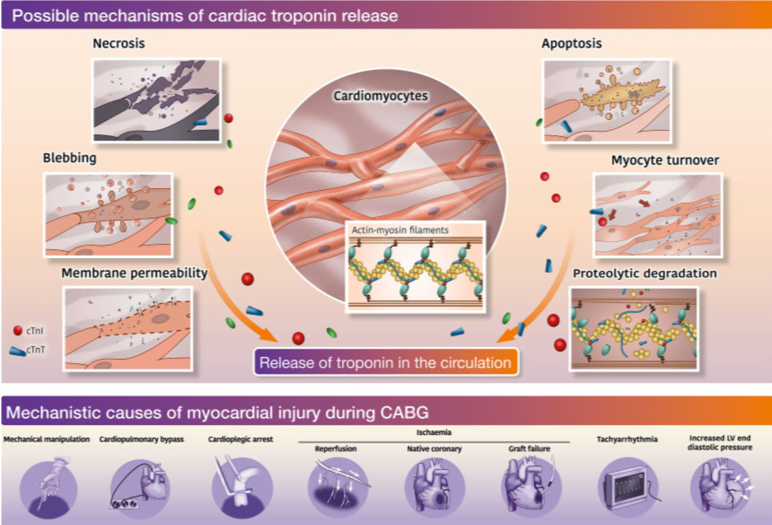Finally, our clinical research focuses on the definition of perioperative myocardial infarction. Myocardial injury during surgery due to surgical manipulation or cardioplegia causes a release of cardiac enzymes; it therefore remains challenging to diagnose perioperative myocardial infarction. However, its detection is of considerable importance, given its major impact on the prognosis of affected patients. Moreover, it is part of the combined endpoint of major studies comparing PCI with CABG. Several definitions of myocardial infarctions exist, all based on perioperative biomarker release and/or additional signs of ischemia. In a recent study including a consecutive cohort of 2829 CABG patients from two tertiary centers we could show that the incidence and prognosis of perioperative myocardial infarction differ markedly depending on the underlying definition of myocardial infarction for patients undergoing CABG. Isolated biomarker-based definitions were not associated with perioperative myocardial infarction relevant to prognosis. We could show that additional signs of ischemia detected by new ECG abnormalities, regional wall motion abnormalities or coronary angiography should result in rapid action in everyday clinical practice. We published two studies on this subject in the prestigious European Heart Journal recently1. Larger Follow-up studies are currently on the way.

Key papers:
Pölzl L, Thielmann M, Cymorek S, Nägele F, Hirsch J, Graber M, Sappler N, Eder J, Staggl S, Theurl F, et al. Impact of myocardial injury after coronary artery bypass grafting on long-term prognosis. Eur Heart J. 2022;43:2407-2417. doi: 10.1093/eurheartj/ehac054
Heuts S, Gollmann-Tepekoylu C, Denessen EJS, Olsthoorn JR, Romeo JLR, Maessen JG, van ‘t Hof AWJ, Bekers O, Hammarsten O, Polzl L, et al. Cardiac troponin release following coronary artery bypass grafting: mechanisms and clinical implications. Eur Heart J. 2022. doi:10.1093/eurheartj/ehac604
